September 24, 2018
Mercy Day
International Women’s Day 2017 has chosen the theme BE BOLD FOR CHANGE
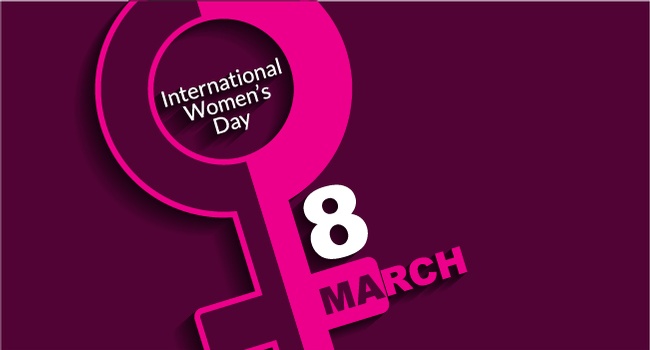
When I thought about the theme for this special day celebrated by women around the globe and contemplated all that is happening in our world, I was drawn to Edwina Gateley’s poem, inviting “we the people” to live with HOPE, despite the darkness and despair that seems to be all around us. Edwina says:
There is a heaviness permeating our globe,
and we, it seems,
are stumbling in this dark place,
blinded by its shadows and
longing for a spark of light.
Even Mother Earth
senses imminent rape from
threats of fracking, mining,
digging, pipe lines, pollution
and more.
Grieved
I ran to the woods
to hide.
Where are You, merciful God?
Where is Your mercy now
for a broken people
and a hurting world?
And from the very soil, the trees,
the air and every living creeping,
crawling, flying, walking,
swimming creature
rose the whisper, thunderous:
Here.
Here I am ?
hiding with you...
Hush.
Here I am.
We must cuddle together,
to share our pain
and we will plot together
to birth
new life...
(Advent 2016)
“And we will cuddle together to share our pain and we will plot together to birth new life.” Isn’t that the boldness and daring that has always permeated our lives as women and men of Mercy?
When I reflected on the poem and the day we are commemorating, I was quickly drawn back to the Dublin of Catherine McAuley’s day and how she “cuddled” with others to do something about the injustices and poverty of her day, birthing the Sisters of Mercy. Catherine became what we would call today a civil rights figure, focusing especially on the plight of women and girls. Today, thousands of her supporters/people across the globe follow in her footsteps, speaking up and standing up for women and girls who are used and abused by systems all over the world.
International Women’s Day is a time of celebration and reflection. We celebrate the significant progress that has been made in building a positive environment for gender equality and women’s empowerment worldwide. To date, 187 countries have ratified the Convention on the Elimination of All Forms of Discrimination against Women (CEDAW); and over 120 have adopted national plans of action for gender equality. Countries emerging from conflict are incorporating provisions for gender equality within their constitutions while others are adopting laws and policies to strengthen women’s access to health, education and employment opportunities and to end impunity for gender-based violence. And women are increasing their representation in high-level decision-making in most areas of life.
But on this day especially, we have to ask what impact these laws and policies have made in the day-to-day lives of women, especially poor women, on the ground?
On International Women’s Day, we remember the women garment workers in sweatshop factories providing cheap clothing for those of us who live in the western hemisphere. We remember victims of trafficking used and reused to feed greed. We remember women denied the right to hold public office because of archaic laws which give the position to someone less qualified and with nearly 3 million popular votes less. We remember women in the church denied their voice. We remember all the hidden women who do groundbreaking work and go unrecognized year in and year out.
On a day like today, it is important to look at the terms and conditions in which so many women and men work to earn their living – for wages that are too meagre to enable them to lift themselves and their families out of poverty. Statistics across the globe indicate that poverty still has a woman’s face and that women and girls are entering the workforce in greater and greater numbers. However, rather than benefiting from the new opportunities opened by globalization, women are less likely than men to hold paid and regular jobs and more often work in the informal economy, which provides little financial security and no social benefits. Nearly 330 million working women earn less than $1 a day – and make up 60 per cent of working people who are still living in poverty; and this inequality is passed on from generation to generation, with girls rather than their brothers being pulled out of school to help make ends meet.
This is a critical moment in the struggle for women, one which cannot be unlinked from larger political and economic shifts and especially as far-right political groups seem to be on the rise. The much-lauded Millennium Development Goals (MDGs), endorsed by the world’s leaders in 2000, which promised gender parity in primary and secondary education by 2005, have never been achieved and now a new round of goals launched in 2015 are also off target!
To bring change to the lives of women on the ground, women need to be BOLD FOR CHANGE and take power into their own hands!
We, Sisters of Mercy and especially our women at the coalface, are already steeped in bold strategies for empowering women and girls. There are many examples of this across the globe but because of limited space I will highlight just four examples which all underline the importance of our campaign on International Women’s Day.
1. Focus on Haiti
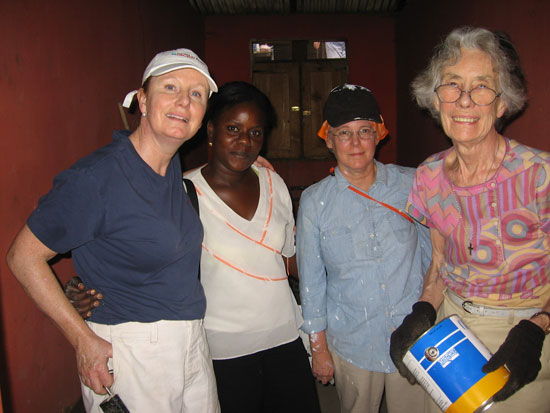 |
| L-r: Andrea Haely, Maryice (on Staff at Bon Samaritan), Mary-Paula Cancienne rsm and Mary Sullivan rsm |
Focus on Haiti (FOH) is certainly an example of a group of Sisters of Mercy huddling together to take action! Catherine’s dream is very much alive in FOH, a group of Sisters of Mercy, Associates and Mercy friends who have been ministering with the Religious of Jesus and Mary and the people of Gros Morne, Haiti. They were responding to a Chapter question: “God of Mercy, of Wisdom and Mystery, where do we need to be led now to come to both a deeper response to our Critical Concerns and a radical embrace of our identity?”
Challenged by this question, a group of Sisters knew in their hearts that Catherine would be present in the poorest country in the Western hemisphere –Haiti.
FOH has been cultivating partnerships with the community of Gros Morne, Haiti. For example, FOH supports the agro-forestry program by providing the salary for the agronomist and his assistant. One of the practices which devastated the country was the cutting down of the forests for fuel and cattle-grazing areas. Through the agro-forestry program, the people have received education regarding the impact of this practice and have planted over 100,000 trees on the hills of Gros Morne. The agronomist and his assistant also have oversight for training local Haitians in goat husbandry and a community hen project. Both of these programs, along with the reforestation and community gardens, have not only provided the community with a sustainable land and food sources, but are developing a micro-economy to allow women to have some source of income.
FOH is also in the process of developing a women’s project, which will include components of education, financial literacy and business skills to empower women in Gros Morne. Catherine would be so excited to know that her vision for solidarity with women – and therefore their children – is alive and well in Haiti! (Mid-Atlantic News, October 2, 2014)
2. Ireland
The work in Creation Spirituality and Environmental Education being undertaken by Mercy Sisters across the globe is another example of the groundbreaking work being undertaken.
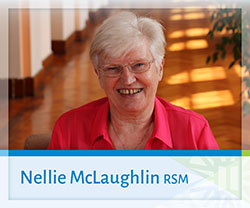 As Nellie McLaughlin rsm teaches and believes…
As Nellie McLaughlin rsm teaches and believes…
“It’s all a question of story. We are in trouble just now because we do not have a good story. We are in between stories. The old story, the account of how the world came to be and how we fit into it, is no longer effective. Yet we have not learned the new story.”
(Thomas Berry, “The Dream of the Earth”)
Nellie says that when we consider our present global reality and allow ourselves to be touched by the cry of the earth, the cry of the poor echoing through life as it unfolds, we are urged to be bold, to work for change so that all beings may feel more at home in our common home. The boldness called for is systemic in nature. I understand it as the invitation for us humans to come home to our true selves and our rightful place in the magnificent web of life. Many of us have disconnected from our deepest roots, resulting in widespread divisions, injustices and impoverishment in the community of creation. Let us dare to reconnect in the context of our evolving and expanding universe of almost 14 billion years, which is exciting and hope-filled, while challenging our perceptions of reality, our attitudes and values. All is evolving, consciousness is expanding, nothing is static and unchanging – our faith, spirituality, theology and the socio-economic, political, religious and cultural systems.
Our foundress, Catherine, intuited this: “The transcendent God chooses to be revealed in the here and now.” Nellie explains: “Core to my ministry in creation spirituality and environmental education is: ‘I have come that you may have life, life in abundance’ (Jn.10:10). The focus is on the bigger picture, the abundance, awe, complexity and wisdom of God’s creative energy pulsating in all of creation. This is the mystery at the heart of life, the unity and oneness manifest in the harmony in right relations: with self, God, people and all creation. In this context we explore the divisions and injustices of our time: climate change, loss of biodiversity, social inequality and the plight of the most vulnerable among people and species. We seek to preserve the living systems of our planet – sun, soil, air, water and equitable social relationships – for the health and prosperity of all. In living these relationships we come to see that the inner and outer journey are one, leading to wholesomeness of self and the wellbeing and service of the common good as we continue to respond to the cry of the earth, the cry of the poor.”
May we, like Teilhard de Chardin, come to realise more fully that “we are not human beings on a spiritual journey, we are spiritual beings on a human journey.”
(Nellie McLaughlin rsm Northern Province, Ireland)
3. Sudan – Nuba Mountains
The work of Sisters of Mercy Nicole Rotaru and Cathy Solano from the Institute of the Sisters of Mercy, Australia, in a war-torn district of the world, bears witness to Catherine’s legacy of standing with the most vulnerable.
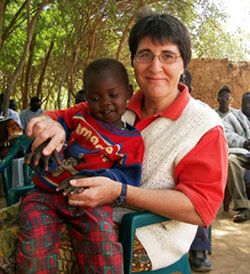 |
| Cathy Solano rsm and Danielle |
4. Partnering Women Religious with UNICEF
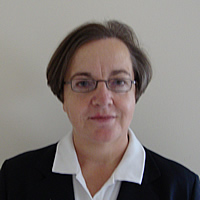 |
| Deirdre Mullan rsm |
In conclusion – and while much more could be written – today is the day when women the globe over come together to speak truth to power. We call for a Global Coalition of Women Economic Decision-makers, committed to making change happen in the lives of ordinary women and men on the ground.
To move from numbers to influence, from a numerical to a strategic presence in decision-making, we need to use our extensive networks and years of service and speak of our experiences and our work for gender equality and women’s empowerment. To do this, we need to continue to empower grass roots and women’s organizations and co-workers to exercise a watchdog function. They can then help to make sure that national resources are allocated all the way to the ground, bringing realities and strategies from the ground to inform policy direction. And we need to bring underrepresented and excluded groups, such as HIV+ women, women informal workers, indigenous women, women survivors of violence, rural poor women into the development process.
Be Bold For Change! Huddle together and plot for a different world and do what you can in your local area to make change happen!
Messages to: Deirdre Mullan rsm
Partnering Women Religious with UNICEF
Image: iStock. Used under licence